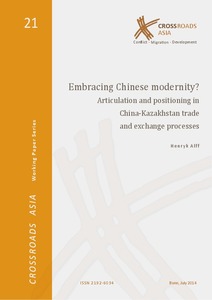Alff, Henryk: Embracing Chinese modernity? Articulation and positioning in China-Kazakhstan trade and exchange processes. Bonn: Competence Network Crossroads Asia: Conflict – Migration – Development, 2014. In: Baldauf, Ingeborg; Conermann, Stephan; Kreutzmann, Hermann; Nadjmabadi, Shahnaz; Reetz, Dietrich; Schetter, Conrad; Sökefeld, Martin; Hornidge, Anna-Katharina (Hrsg.): Crossroads Asia Working Paper Series, 21.
Online-Ausgabe in bonndoc: https://hdl.handle.net/20.500.11811/154
Online-Ausgabe in bonndoc: https://hdl.handle.net/20.500.11811/154
@techreport{handle:20.500.11811/154,
author = {{Henryk Alff}},
editor = {{Ingeborg Baldauf} and {Stephan Conermann} and {Hermann Kreutzmann} and {Shahnaz Nadjmabadi} and {Dietrich Reetz} and {Conrad Schetter} and {Martin Sökefeld} and {Anna-Katharina Hornidge}},
title = {Embracing Chinese modernity? Articulation and positioning in China-Kazakhstan trade and exchange processes},
publisher = {Competence Network Crossroads Asia: Conflict – Migration – Development},
year = 2014,
month = jul,
series = {Crossroads Asia Working Paper Series},
volume = 21,
note = {While much has been written recently about the increasing geo-political and economic impact of Chinese ‘soft power’ on neighbouring countries to the West, relatively few studies explore local people’s reflections of China’s rise in its north-western borderlands. In this paper, I argue that people in Kazakhstan oriented in their commercial activities at China due to experiences of enduring interaction within business networks stretching to Beijing, Shanghai or Guangzhou often support affirmative views towards Chinese modernity. This perspective, while defying widespread sinophobia in Kazakhstan’s society, has partly triggered concerns among the involved actors vis-á-vis the post-Soviet state’s capability in providing socio-economic development and has, at the same time, enabled them to strengthen their agency in cross-border commercial exchange. Based on recent ethnographical research on Bolashak Bazaar in Almaty and in a Dungan village cluster near the border with Kyrgyzstan, this working paper elaborates how trade actors both articulate their positioning and become situated in development discourses and how state-endorsed principles of Chinese modernity are utilised and accommodated with established representations of social change. By so doing, the working paper aims to contribute to a better understanding of the dynamic impact of translocal connections and flows of ideas on the everyday negotiation of development and social change.},
url = {https://hdl.handle.net/20.500.11811/154}
}
author = {{Henryk Alff}},
editor = {{Ingeborg Baldauf} and {Stephan Conermann} and {Hermann Kreutzmann} and {Shahnaz Nadjmabadi} and {Dietrich Reetz} and {Conrad Schetter} and {Martin Sökefeld} and {Anna-Katharina Hornidge}},
title = {Embracing Chinese modernity? Articulation and positioning in China-Kazakhstan trade and exchange processes},
publisher = {Competence Network Crossroads Asia: Conflict – Migration – Development},
year = 2014,
month = jul,
series = {Crossroads Asia Working Paper Series},
volume = 21,
note = {While much has been written recently about the increasing geo-political and economic impact of Chinese ‘soft power’ on neighbouring countries to the West, relatively few studies explore local people’s reflections of China’s rise in its north-western borderlands. In this paper, I argue that people in Kazakhstan oriented in their commercial activities at China due to experiences of enduring interaction within business networks stretching to Beijing, Shanghai or Guangzhou often support affirmative views towards Chinese modernity. This perspective, while defying widespread sinophobia in Kazakhstan’s society, has partly triggered concerns among the involved actors vis-á-vis the post-Soviet state’s capability in providing socio-economic development and has, at the same time, enabled them to strengthen their agency in cross-border commercial exchange. Based on recent ethnographical research on Bolashak Bazaar in Almaty and in a Dungan village cluster near the border with Kyrgyzstan, this working paper elaborates how trade actors both articulate their positioning and become situated in development discourses and how state-endorsed principles of Chinese modernity are utilised and accommodated with established representations of social change. By so doing, the working paper aims to contribute to a better understanding of the dynamic impact of translocal connections and flows of ideas on the everyday negotiation of development and social change.},
url = {https://hdl.handle.net/20.500.11811/154}
}






